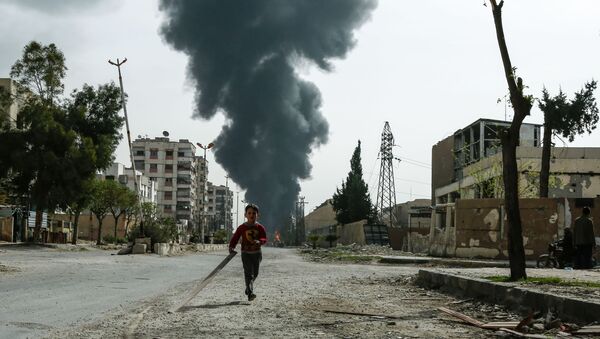Sputnik: Could Damascus still have access to chemical weapons?
Lorenzo Trombetta: It's very hard to be precise with these questions. But we should remind that Organization for the Prohibition of Chemical Weapons has repeatedly affirmed that it was nearly impossible to verify if the Syrian government had really delivered the entire content of its chemical arsenal to the international organization, to the UN observers. We may say that the Syrian government still has some depots of toxic gas or so called chemical weapons inside their country.
READ MORE: Douma Chemical Attack: Is Bashar al-Assad the Stupidest Man On the Planet?
Sputnik: Because it is a war situation is it really possible now to assert they have control of all of their chemical weapons? And that those weapons were not taken over by various factions that are fighting within the country?
Lorenzo Trombetta: It is an eventuality that could be possible but per se with Douma situation; Douma is a very small neighborhood nowadays, fully surrounded by government forces and pro-government militia. It could be very difficult that the government and its allies do not have the knowledge of who and where these stocks of weapons could be placed nowadays. It is up to Damascus and its allies to clearly show where opposition militia, the non-state armed groups, could really have their deposit of chemical weapons and how they can use it. Beyond that, all the allegations all, the accusations could be done, but we need proof and evidence on this.
READ MORE: Douma Medics Received No Patients With Signs of Chemical Poisoning — Russian MoD
Sputnik: What kind of steps do you think will be taken to determine who is at fault and to perhaps deter further attacks?
Lorenzo Trombetta: As we've seen in the past, the Security Council has two main factions: one supporting the Syrian government and the other one, clearly led by the US, accusing the Syrian government and their allies to continue against civilian population to perpetrate crimes and so on. Beyond the humanitarian aspect of this issue the Security Council we will have political discussion and all the factions all the parties will fight to exploit the alleged chemical attacks for political influence. I think that at the end of the discussion at the UN Security Council, no steps will be taken because of the cross vetoes from the US or from Russia. Both sides will remain on their stances, without taking any concrete steps on both directions, or preventing further attacks or letting the parties that were responsible for the alleged attacks to continue on this path.
READ MORE: OPCW Made Preliminary Analysis of Allegations of Chemical Attack in Douma, Syria
Sputnik: President Trump recently said that the US troops will soon leave Syria. He also said that he will leave it to somebody else to take care of it. Do you think that this is going to happen or could this latest attack serve as reason for the US to stay in Syria?
Lorenzo Trombetta: From Washington we see contradictory signs on what could be the US stance on Syria. But in the long term and strategically, the United States are looking to Syria as a buffer zone protecting US interests in Iraq and the Gulf. So, as we can see since 2014-2015, US troops are present on the eastern side of Syria, mainly on the eastern side of Euphrates River, where the region's border close to the Iraqi border are most significant in terms of strategic interests for the US. I don't think that these political repercussions of the alleged chemical attack on Douma could alter the US stance on Syria and could also divert the attention of the US in withdrawing or reinforcing their military presence in Eastern Syria. I stress Eastern Syria because what happened in Douma and what happened in […] central Syria is little bit far from the US presence and far from political US interests in Syria.
The views and opinions expressed are those of the speaker and do not necessarily reflect those of Sputnik.

